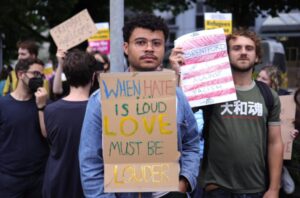My broadband is on the blink.
This week, I had a visit from the third engineer who’s been sent to help get my wifi back up and running. Let’s call her Jo. Jo was really nice, super helpful and tried her best to get it fixed.
At one point, after handing me a new ethernet cable, she brought up the riots, saying. “I can understand where people are coming from. The English get nothing from the Government nowadays.” And went on to tell me about a friend who had become homeless, who couldn’t get a council house, and was sofa surfing.
I felt my chest tighten a bit. When you work for Larger Us, you learn to spot opportunities for a courageous conversation – one you might not want to have, but really should have – from a mile off. This was one of those times.
It was the casual justification of violence that frustrated me – the dangerous narrative that somehow the racist and Islamaphobic abuse and attacks were a valid response to concerns someone might have about life in the UK..
But still, my initial instinct was to let it go. To thank her for her efforts and send her on her way. No-one would know I had chickened out. Then two thoughts pushed their way into my head..
First, this is what we ask the people who take part in our climate conversations training to do all the time – acknowledge the awkwardness you feel when speaking about a tricky topic but do it anyway.
And second, that morning I had read this tweet from psychologist Dr Peter Olusoga:
“To everyone out there who joined the great anti-racism book club of 2020, everyone who read a couple books and took a knee in a park for your Facebook profiles… you can shove your black Instagram squares right firmly up your arse if you’re staying quiet now.
Right up there.”
Helpfully clarifying, right?
And so, with my heart beating a little bit faster, I decided to say something, or more accurately, to open up the conversation a little bit, using some of the techniques we’ve been sharing with people in our climate conversations training.
I’m sharing them now – especially for people like me, who are white, and not targeted by the riots – in the hope they might come in useful now or in the future.
1. I listened (but I should have asked more questions).
At Larger Us we love the quote from writer Amanda Ripley, who says: “Humans need to be heard before they will listen.” It’s one of those truths you can feel in your bones. So I listened to Jo’s story about her friend, what happened to her once the council said they couldn’t help, and how lucky she had been to have her housing situation resolved after weeks of staying on people’s sofas.
I don’t think I asked her any curious questions though, which would have been an even better thing to do. It shows the other person you care about what they’re saying, and helps you to build up a fuller picture of who they are and what they care about. I could have asked ‘how long have you known your friend?’ or ‘how is she doing now?’. Still, as we tell our trainees, conversations don’t have to be perfect: they just have to happen.
2. I empathised (while staying true to my own values)
I genuinely share Jo’s anger and frustration about her friend not being able to find a safe place to live when she became homeless, and told her so. I added that I used to work for the YMCA and the homeless hostel there was filled with single people because they came so low down on the council’s priority list for housing compared to those with children. By sharing this, I acknowledged the problem she raised existed, I didn’t try to minimise or reason away her friend’s experience.
Even though I disagreed with Jo’s conclusion – essentially that ‘British born’ people can’t get housing because foreigners are jumping the queue and therefore this somehow justifies the rioting – we did agree about the problem that too many people don’t have anywhere safe and affordable to live.
3. I humanised (and told stories)
I used to work for an organisation that brought communities together with people seeking asylum, so I talked a bit about this, and the meals I’d shared with people who lived in places like the hotels the rioters had set fire to. Once I spoke about my experiences, I noticed that for Jo this conversation was probably taking a turn she hadn’t expected. I didn’t directly contradict her view, I gave her no reason to feel defensive, I just shared stories about people I knew. And because I had listened to her, she listened to me.
I know not everyone reading this will have had exactly the same kind of experience as I’ve had working with refugees, but maybe you’ve encountered migrants in other areas of life, or perhaps you have Muslim friends or colleagues who have been impacted by what is happening and you can speak about them. Stories about friends or people we know are so much more powerful than facts and figures. Or maybe you can simply say, ‘it must be so scary having people turn up at your place of worship to scream at or assault you’.
4. I didn’t try to change her mind (much).
This is such a hard one. I think our default in these situations is that we have to ‘win’ the conversation, to turn it into a debate, to use our incredible oratory powers of persuasion to show the other person exactly where they’ve been going wrong.
I had so much I wanted to say, and to be honest I did struggle to keep a lid on it. I did say something to Jo about Tories selling off council houses, and also mentioned that a white man killed three women with a crossbow last month and nobody rioted about that.
But the key point is that I managed to catch myself before I went on a huge rant that would have no doubt completely alienated her. If you want to introduce someone to an alternative point of view, ramming it down their throat is the worst way to go about it. When was the last time you changed your mind about something because someone relentlessly berated or shamed you?
5. I managed my emotions (and sounded off elsewhere)
I’ve been feeling all kinds of things since the riots started. Fury, a creeping sense of dread, positive apoplexy about men and their insistence on meeting the violence perpetrated against a woman and little girls with yet more violence. And none of these emotions had anything to do with Jo, they were mine to own and to deal with.
The moment she started talking about the riots, I could feel all of them bubbling up inside of me – all the unprocessed mess that had been going on in my head and my heart over the weekend threatened to explode all over this woman who I’d met 15 minutes earlier and had only come to fix the broadband.
This is why we tell people to start by listening. It’s a practical way to turn down the volume of your inner voice and tune into someone else’s – to really hear someone, you need to actively listen and this takes effort. It’s much harder to hold onto anger and self righteousness when you’re in listening mode.
We all need to let off steam now and again, but there’s a time and place – maybe for you it’s journaling or a rant over coffee with someone you love. For me, it’s leaving incoherent and lengthy Whatsapp voice notes for friends who I know will agree with me – which is what I did later that day.
All this is to say that Jo and I parted on friendly terms. Neither of us became angry, we didn’t talk past each other and I didn’t convert her into a refugee rights activist; instead we shared stories, and I think if our paths crossed again, we could continue the conversation.
But what did happen was disruption. Disruption of that destructive narrative – of violence somehow being justified – that has spread through communities like political knotweed.
And disruption might have more of an impact than you think.
Recent polling tells us that only 7% of people in the UK support the violence we’ve seen on our streets but that of those 7%, two-thirds of them think that most people in Britain do too.
So there’s a huge opportunity here for us. If we come across someone who thinks the riots are justified, there’s a fair chance they will assume we agree with them, so opening up a conversation could go a long way to helping them realise that other viewpoints exist outside of their bubble – that most people are horrified, and are in solidarity with those under attack.
And we can have this impact without having to shame or shout anyone down.
Conversations – real ones, not pretend or performative ones where we pontificate from our soapbox – are hard, and even a bit scary, but they are important. Our Muslim, Black and Asian friends need us. We don’t need to be perfect, but we can be brave.


